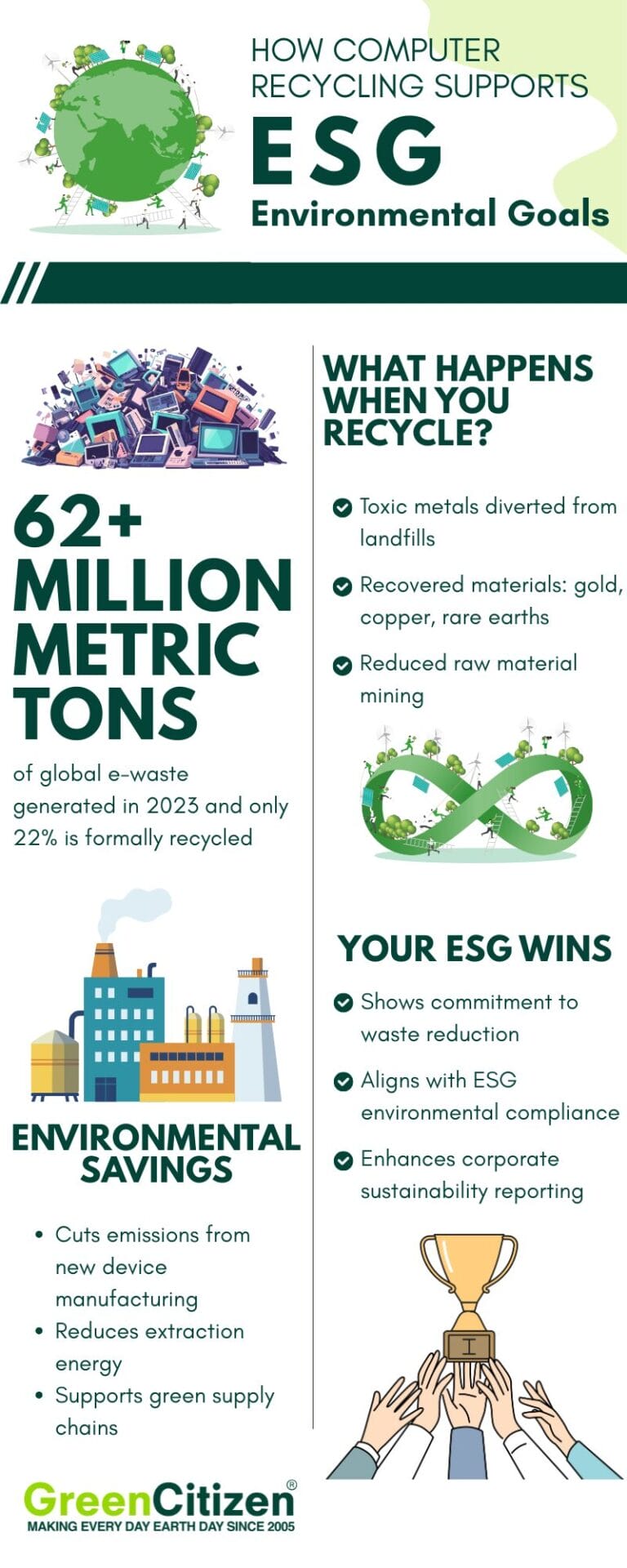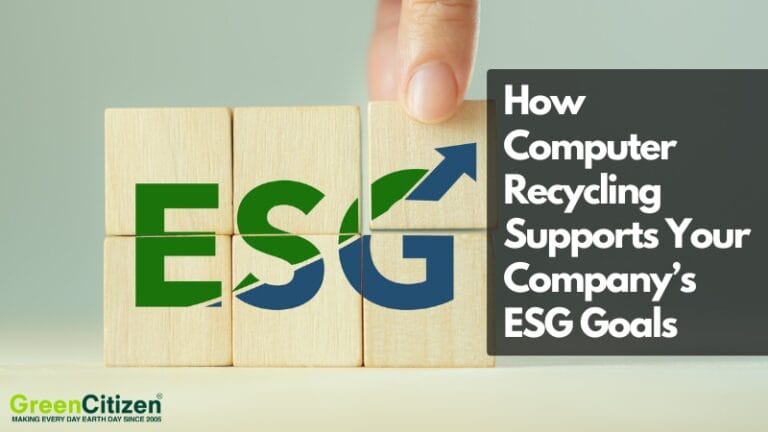Environmental, Social, and Governance (ESG) goals are no longer a buzzword—they’re a business priority. Investors demand transparency. Customers expect accountability. And governments are tightening regulations on everything from carbon emissions to electronic waste.
In this climate, how your company manages its old tech matters. Outdated computers aren’t just clutter—they’re liabilities. Improper disposal can mean data breaches, toxic waste, and missed sustainability targets.
That’s where a strategic computer recycling program comes in. Beyond clearing office space, it’s a powerful way to align your operations with ESG compliance, reduce environmental impact, and strengthen your company’s reputation.
In this guide, we’ll explore how responsible IT asset disposal supports each pillar of ESG—and how your business can turn recycling into a competitive advantage.
Key Takeaway: How Computer Recycling Supports ESG Goals
Computer recycling directly advances ESG goals by reducing e-waste, protecting sensitive data, and ensuring regulatory compliance. A certified ITAD program strengthens environmental performance, supports ethical labor, and offers audit-ready documentation. It’s not just waste management — it’s a strategic asset for ESG reporting and stakeholder trust.
Environmental Impact: Reducing E-Waste and Carbon Footprint
Every outdated laptop or desktop you toss improperly adds to the world’s growing e-waste crisis. In 2023 alone, the world generated over 62 million metric tons of e-waste—most of it never recycled. For businesses, this isn’t just an environmental concern—it’s a missed ESG opportunity.
Recycling your company’s computers through certified channels keeps toxic components like lead, mercury, and cadmium out of landfills. These heavy metals can leach into soil and waterways, harming ecosystems and public health. Proper disposal also supports resource recovery, allowing valuable materials like aluminum, copper, and rare earth metals to be reused instead of mined.
What’s more, computer recycling significantly lowers your IT carbon footprint. Manufacturing new devices consumes energy and raw materials. By extending device lifecycles and embracing reuse, companies reduce emissions tied to extraction, production, and shipping.
Responsible e-waste recycling isn’t just good PR—it’s a concrete way to meet environmental benchmarks under your ESG framework.

Social Responsibility: Data Security and Ethical Labor
Recycling your company’s computers isn’t just about environmental compliance — it’s also a matter of protecting people. Social responsibility in ESG means safeguarding your stakeholders and ensuring your supply chain aligns with ethical standards.
Old computers often contain sensitive data — customer records, financial info, employee files. Improper disposal puts this data at risk. Partnering with certified recyclers that offer secure data destruction services ensures complete erasure, preventing data breaches and legal liabilities.
But social impact goes beyond the office. Many electronics are processed in developing regions under unsafe labor conditions. When you choose R2 or e-Stewards certified recyclers, you’re ensuring your e-waste doesn’t end up in informal scrapyards where workers are exposed to toxic materials without protection.
Responsible computer recycling helps your company:
- Protect user and employee data
- Support ethical labor practices globally
- Uphold human rights across your supply chain
- Avoid reputational and legal fallout
Sustainable IT disposal is part of treating people — both inside and outside your company — with respect.

Read More:
Governance: Meeting Compliance and Reporting Standards
Governance is the backbone of a strong ESG strategy — and when it comes to computer recycling, it’s all about transparency, accountability, and risk management.
Businesses today face growing pressure to comply with e-waste regulations, data privacy laws, and internal ESG benchmarks. Improper computer disposal can lead to fines, failed audits, or even data breach liabilities.
A certified IT asset disposition (ITAD) partner ensures your hardware is recycled responsibly — but more importantly, it helps you document every step. From serial tracking to chain-of-custody reports, you gain access to audit-ready documentation that satisfies ESG investors, regulatory bodies, and internal stakeholders alike.
If you’re using a platform like GreenCitizen’s GTAMS (Total Accountability Management System), you’ll also receive complete transparency over how each device was handled — including whether it was refurbished, recycled, or securely destroyed.
Governance wins through:
- Detailed ESG-aligned recycling documentation
- Secure, trackable IT disposal process
- Proof of compliance with environmental and privacy regulations
- Reduced legal and reputational risk
With proper governance, computer recycling isn’t just a good idea — it becomes a defensible ESG asset.
How to Build an ESG-Aligned Computer Recycling Program
A strong corporate e-waste recycling program doesn’t happen by accident — it’s built with intention, compliance, and traceability. Whether you’re managing end-of-life laptops or retiring an entire fleet of desktops, aligning your disposal strategy with ESG goals starts with a structured approach.
Step 1: Conduct an IT Asset Audit
Take inventory of all outdated computers and related hardware. Identify which devices hold sensitive data and which could be refurbished or recycled. This audit forms the foundation for tracking and ESG reporting.
Step 2: Choose a Certified ITAD Partner
Partner with an R2 or e-Stewards certified recycler that aligns with your company’s ESG values. Ask about secure data destruction, ethical downstream partners, and reporting tools.
Step 3: Implement Traceable Recycling Workflows
Your ESG strategy needs documentation. Systems like GreenCitizen’s GTAMS (Green Total Accountability Management System) offer full visibility into what happens to each device — including refurbishment, shredding, or certified recycling.
Step 4: Train Teams and Establish SOPs
Educate IT, operations, and compliance teams on your recycling policy. Standard operating procedures ensure consistent, responsible hardware disposition at every location.
Step 5: Monitor, Report, and Improve
Track performance, spot inefficiencies, and continuously refine your ITAD ESG strategy. ESG isn’t static — your recycling program shouldn’t be either.
For businesses in the San Francisco Bay Area, GreenCitizen offers business recycling pickup services, making it easy to integrate responsible computer recycling into your sustainability roadmap.
Why ESG Goals Belong in Every Business Strategy
ESG goals aren’t just about making your company look good — they’re about building a resilient, future-ready business. Whether you’re recycling electronics, cutting hazardous waste, or encouraging employees to engage in sustainable practices, ESG goals represent your company’s commitment to long-term success.
Take computer recycling for businesses, for example. A well-designed recycling program helps divert e-waste from landfills, reduces your ecological footprint, and aligns with evolving regulatory compliance standards. More importantly, it helps companies meet their environmental goals without disrupting operations.
But the benefits don’t stop at the environment. ESG initiatives also:
- Mitigate risks tied to improper disposal of electronic devices and hazardous waste
- Strengthen stakeholder relationships and build stakeholder trust
- Enhance brand reputation with customers and local communities
- Support financial performance by meeting investor demands for ethical business practices
When your ESG objectives are tied to measurable outcomes — like reducing greenhouse gas emissions or increasing board diversity — they become more than ideals. They become drivers of real change.
Ultimately, smart ESG goals turn sustainability into strategy. They align your company’s mission with stakeholder expectations, create value for internal and external stakeholders, and future-proof your operations against everything from climate change to supply chain disruptions.
Future-Proof Your ESG Strategy with Responsible Recycling
Every outdated computer sitting in your office is an opportunity — not just to free up space, but to strengthen your company’s ESG position. From reducing environmental impact to protecting sensitive data and meeting compliance standards, recycling electronics responsibly delivers real wins across all three pillars of ESG.
A strategic IT asset disposition (ITAD) program isn’t just about disposal — it’s about building a more sustainable IT infrastructure that aligns with your values, satisfies regulatory requirements, and supports long-term stakeholder trust.
If you’re ready to take the next step, GreenCitizen offers business recycling pickup across the San Francisco Bay Area. And with our GTAMS tracking system, you’ll always know exactly how your equipment was handled — sustainably and securely.
Make recycling part of your ESG strategy — and make it count.
